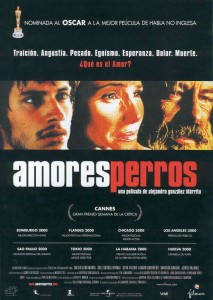 Like it or not, the truth is that life is almost never fair; there will always be differences in terms of wealth, and status.
Like it or not, the truth is that life is almost never fair; there will always be differences in terms of wealth, and status.
As grotesque as it sounds, the only grand equalizer for humanity is the universal struggle (for different causes, of course) and the tragic occurrences that seem to be the only power that brings into contact (both literally and figuratively) worlds with otherwise no touching points. Faithful to the trademark of anthology films and borrowing some neo-realistic elements, Mexican movie director Alejandro González Iñárritu (“21 Grams,†“Babelâ€) proves how dog-like life could get in his film “Amores Perros,†which got him an Oscar nod for Best Foreign Language Film of 2000 and won him an Ariel Award (roughly the Mexican equivalent of the Oscars) for Best Picture.
Even though the English translation of the title, “Love’s a Bitch,†is somehow less than censor-friendly, it perfectly conveys the message sent by González Iñárritu about life in the unforgiving atmosphere of Mexico City.
“Amores Perros†presents, in an anthology-like fashion, three life stories that, on the surface, have nothing in common, except for the fact that the characters occasionally pass one another by on the overcrowded streets of Mexico City. Yet, the much deeper themes that connect all those strangers – the eternal struggle and the inevitable life victimization – penetrate the plot via the physical images of dogs and cars. The gory automobile collision, on the other hand, marks the symbolic “union†among the different social layers and changes the lives of its members forever.
First, the audience is acquainted with the story of Octavio, a lower-class man who still lives in his mother’s house, does dead-end jobs in order to make ends meet and has a passion for betting on dogfights that earn him some extra income. Octavio’s problem is that he is madly in love with his sister-in-law Susana, and despite the fact that she already has an out-of-wedlock child with his brother, Octavio urges her to run away with him. The naïve and nubile Susana reacts with mixed feelings of reluctance, passion and fear to his fervent advances. The young and promising Mexican actor Gabriel Garcia Bernal(“Y tu mama tambien,†“Motorcycle Diaries,†“Babelâ€) gives one of the best performances of his career by portraying Octavio. He is more than believable in embodying this lower-class unambitious man. Garcia-Bernal also seems to have very strong rapport with the director Gonzalez-Inarritu, obvious both in “Amores Perros†and “Babel,†with the last earning the director a Golden Globe for Best Motion Picture. The actor’s mestizo-like appearance, alongside with Vanessa Bauche’s (“Al otro lado,†“Mexico Cityâ€) Mayan looks gives a hint about the racial class division in Mexico City.
The broadcasting of the reality show “Gente de hoy†is the only bridge between the world of Octavio and the world of the beautiful, tall, light-skinned, blond Spaniard top-model Valeria (Goya Toledo, “Killing Wordsâ€). Serving as the face of a big cosmetics company and being the lover of the prosperous fashion magazine publisher Daniel (Alvaro Guerrero, “Amarâ€), who showers her with money and buys her a trendy penthouse apartment, Valeria’s only care in the world seems to be petting her tiny poodle, Richie. Her life is an exemplum for perfection until the day she crashes her fancy car into Octavio’s rusty used automobile, has her leg amputated, says goodbye to her glamorous career and, on top of everything, her Richie falls in a hole on a wooden floor.
Her life will never be the same thanks to…the lowlife Octavio.
Despite the fact that she is a relative newcomer on the big screen, Goya Toledo is very convincing in portraying her egoistical and self-absorbed upper-class character. Being a former model herself, the Spaniard Toledo adds her own expertise on this unforgiving business to her good acting abilities.
Another prominent Mexican actor Emilio Echevarria (“Y tu mama tambien,†“Babelâ€) embodies himself into the messiah-like image of El Chivo, who witnesses the car crash and “life crash†of Octavio’s and Valeria’s worlds. El Chivo, a former college professor, has turned into a homeless wino living in abandoned warehouse and taking care of a bunch of dogs without shelter. After being incarcerated for 20 years after carrying on a vicious terrorist plot, he desperately tries to re-establish his relationship with his daughter, to whom he was presumed dead.
Although Echevarria’s character has little to no lines here, his image is persistent throughout the whole duration of the movie and his weird actions (assassinating upper-class businessmen, sticking his own pictures on the family album, kidnapping rich people, caressing wounded dogs) help the main point of the movie come across.
Appearing as a bystander in both the stories of Octavio and Susana and Daniel and Valeria, El Chivo is a Christ-like figure that pays for struggles of all the classes in Mexico, and probably in the universe. Unlike the previous stories which are shown in a point-by-point fashion, his life is extended throughout the whole plot.
The charm of “Amores Perros†hides in its nonconformity, its originality, its lack of protagonists, its realistic outcomes. “Amores Perros†is a poignant, contemplative, self-reflective must-see movie.

Leave a Reply